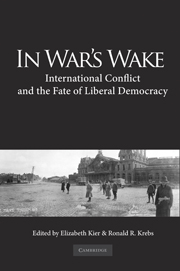Book contents
- Frontmatter
- Contents
- List of Contributors
- Acknowledgments
- 1 Introduction
- PART I WAR AND DEMOCRATIC TRANSITIONS: NEW AND DURABLE DEMOCRACIES?
- PART II WAR AND DEMOCRATIC PUBLICS: RESHAPING POLITICAL PARTICIPATION?
- PART III WAR AND DEMOCRATIC STATES: GOVERNMENT BY THE PEOPLE OR OVER THE PEOPLE?
- 9 International Conflict and the Constitutional Balance
- 10 Claims and Capacity
- 11 War, Recruitment Systems, and Democracy
- 12 Concluding Reflections
- References
- Index
11 - War, Recruitment Systems, and Democracy
Published online by Cambridge University Press: 05 June 2012
- Frontmatter
- Contents
- List of Contributors
- Acknowledgments
- 1 Introduction
- PART I WAR AND DEMOCRATIC TRANSITIONS: NEW AND DURABLE DEMOCRACIES?
- PART II WAR AND DEMOCRATIC PUBLICS: RESHAPING POLITICAL PARTICIPATION?
- PART III WAR AND DEMOCRATIC STATES: GOVERNMENT BY THE PEOPLE OR OVER THE PEOPLE?
- 9 International Conflict and the Constitutional Balance
- 10 Claims and Capacity
- 11 War, Recruitment Systems, and Democracy
- 12 Concluding Reflections
- References
- Index
Summary
War is an exogenous shock – allowing opportunities for vast changes in the political landscape or solidifying changes underway. War played a significant role as a catalyst that moved France (and then other countries in Europe) toward citizen armies in the nineteenth century. This was an important military change, but it also proved important for democracy. The citizen army as a recruitment practice in democracies both reflected democratic principles and was supportive of democratic practices. War, however, was also important in pushing the United States (joined by Britain and other European states) toward a vast privatization of military and security services in the 1990s, something that is increasingly affecting policy options in the Western world. These changes are far less supportive of democratic practices in the United States and may lay permissive conditions for undemocratic policies in states more broadly. In each of these change episodes, war not only served as a catalyst, but also as a screening device. The perception that the new citizen army contributed to French victory in the Napoleonic Wars strengthened the belief that citizen armies were more effective and aided their spread, and the perception that privatized military force has been effective has similarly made it an attractive solution to short-handed militaries around the globe.
In what follows, I first outline my general approach and then examine the politics of both cases. I focus on how war's catalytic developments were understood and used to create the political momentum necessary for change.
- Type
- Chapter
- Information
- In War’s WakeInternational Conflict and the Fate of Liberal Democracy, pp. 235 - 252Publisher: Cambridge University PressPrint publication year: 2010
- 1
- Cited by

